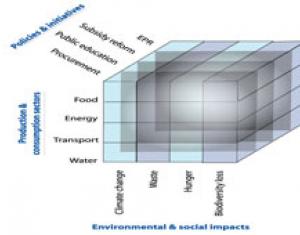Integration, as discussed here, refers to the act of bringing together and unifying ideas, disciplines, organizations and/or other elements meaningful to understanding and solving a problem, but not necessarily considered or included in current approaches. ISF is continually searching for those integrative strategies (or meta-strategies) which (1) address major environmental and/or social problems (i.e., impacts) resulting from (2) unsustainable production/consumption practices, processes and systems across sectors (e.g., food, energy, transport, water), through strategic coordination of the different but critically relevant strategies, initiatives, policies and approaches (e.g., procurement, education, subsidy reform, Extended Producer Responsibility) targeting different leverage points in the system (e.g., values, investment, production, distribution, consumption, waste/pollution). This integrative approach requires communication, collaboration and coordination among the different communities of practice engaged in those strategies/initiatives and sectors.
Read moreMany of the major global crises we are facing today represent the consequential impacts from unsustainable production and consumption systems, and practices. Too long neglected as the unfortunate externalities of business as usual, these problems eventually cannot be ignored. When disasters such as the Exxon Valdez oil spill draw attention to the many other chemical spills and pollution, or tragedies such as Bhopal where thousands of people die from inadequate precautionary measures, the public becomes increasingly aware of the broader crisis of unsustainable practices and systems. To address these problems requires tracking them back to their root causes.
Read MoreThe economy is the term encompassing the various systems of investment, production, extraction, transport, packaging, trade, sales, marketing, purchasing, consumption and ultimate disposal of goods and services within a society. These systems include food, transportation, energy, buildings, water, media, clothing, chemicals, mining, tourism and many others. The sustainability of these systems and the overall economy depend on the degree, methods and impacts of meeting basic and luxury needs and wants. Often the negative impacts are externalized to other domains -- most often to vulnerable communities, peoples and ecosystems. How to transform these systems and practices to improve the quality of life for all without causing harm is the challenge.
Read moreIntegrative strategies emerge from the recognition that some problems are not black and white issues nor can be solved through competition and individual skill and cleverness, especially when those problems are interconnected with other problems and demands. Sustainability solutions call for a multi-dimensional understanding and approach to effectively address today's complex challenges and needs, in turn calling for a convergence of strategies and communities of practice working within and across different sectors.
Learn more



